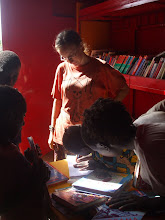Every morning one of the women knocks on my door before six, to wake me up for an early meal before dawn. We all stagger over to the bowl, half-asleep, and eat spoonfuls of watery millet porridge - "funde" - in the dark. The morning prayer usually comes around this time, too, which I usually don't get to hear because I'm asleep. I can't eat very much so early, so after a few bites I'm ready to go back to bed for an hour or so until the sun starts to rise over the top of my millet-stalk fence and people begin going about their day. Long gone are the days I used to recline in bed until ten on the weekends; now I'm up around seven, and if I'm feeling lazy I may stretch it ti seven thirty, but my "sleeping in" is not impressive. I feel like I should at least be up and about while little girls are already starting their morning by pounding millet into flour, women are pulling water, and people are busying themselves with chores. Anyway, after that pre-dawn breakfast there's nothing to eat until 7:30pm, when the prayer calls us again to break the fast. During the day no one eats or drinks anything. They even spit out their saliva so as not to swallow it. I do not do this. Instead I sustain myself with water when I feel thirsty, or a small candy to tide me over the hungry times, though of course I don't do that in front of anyone. Fasting isn't very hard at all when you drink, but I can't imagine how difficult it must be to have no water at all in your system. And I don't care to find out. Somehow, despite the fast, life goes on in the village. The women pull just as much water from the well, morning and afternoon (though how they're even moving beyond noon is beyond me), and people do light field work in the morning if there is any. But, things do move somewhat slower than usual. The daily market doesn't start now until 5pm, when it used to be going by 11, but no one starts cooking until late during Ramadan. On my last trip to Kaolack I bought a game they call "Lido", a four-color game with rules that I still find baffling. The version I got has pictures of Senegalese music stars, but there are also ones with soccer players or marabouts; there's a lot of variety. It is, incidentally, the only board game I've ever seen in Senegal. "Lido" gets a lof of action these days, as people finally have time to relax. Most of the farming is done; we're just waiting for harvestime. Beans are already ripe, and I've been collecting them from the various fields to weigh and calculate how productive that plot was. For the most part the beans produced high yields, and people are glad to have them now, when money is tight and they can add a nice protein boost to a rice-based meal. Plus they're delicious. Corn, too, is ripe. At the louma the streets are lined with corn, and kids strip the husks into threads to practice braiding. In the evening after breaking fast we've been roasting cobs on a charcoal brazier, until the kernels are black. The corn is not sweet or juicy like I'm used to at home, but it has a heavy, earthy flavor and a pleasing texture. I really enjoy nibbling on blackened corn before dinner. Our fast is broken with a cup of hot coffee or kinkiliba tea. My basil is a favorite with the neighborhood, because people like to mix it with the kinkiliba leaves when boiling the tea. It adds a nice aroma and you can really taste the basil. I give out a lot of basil leaves, and those who planted their own from my mother plant's cuttings are using it too. Along with our hot drink is bread, if the family can afford it, which is not usually. If there is, though, that's the first solid thing I've eaten since liquidy funde hours and hours before. Also, we get a cup of cool bissap juice. Then a little while after dinner is served, which is a rice dish, not millet cere as usual. So far the food has been very tasty, which is good news as it's the only meal of the day!
Ramadan could be an excruciatingly slow time of year for us Peace Corps Volunteers, but I managed to stay busy this week by finishing up the paintings at the school. Now each of the four classrooms has some colorful scenes, painted by myself and whatever kids I could round up. Besides the room with the maps, there is now a room painted with domestic animals, and two with scenes of village life and learning. Only a few touch-ups to go - I plan to paint a Senegal flag in each room, too - and we're done! The school looks great, and everyone who has peeked their heads in has been delighted. Hopefully the teachers like it too, when they come back for the start of school next month.
Tuesday, September 9, 2008
Subscribe to:
Post Comments (Atom)


1 comment:
What you write has such meaning to all of us readers.I can feel the slowness of the days now.And taste the basil.I also wonder if the fasting brings contemplation and a sense of clearing-out.And I can see your artistic touch in the school.You've done so much.Amazing.
Post a Comment